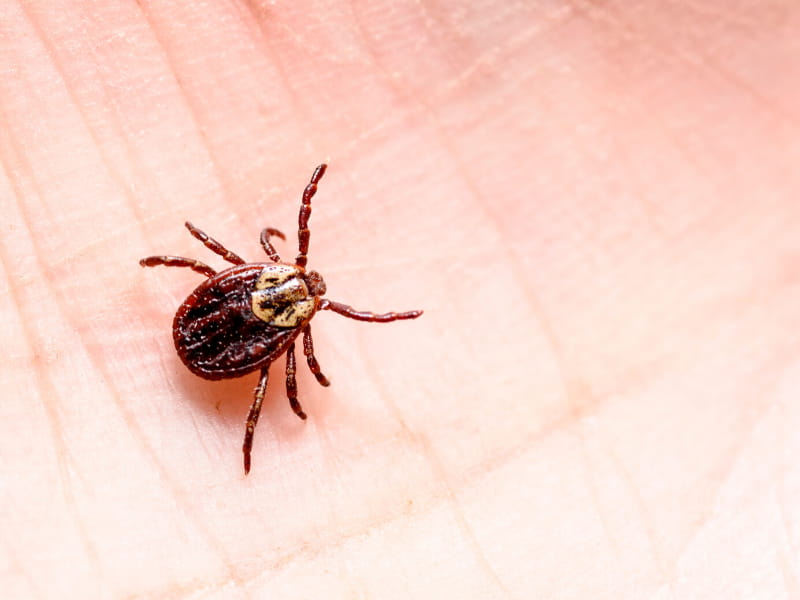Tick, tick, tick – time is short when these arachnids attack

As miserable, flesh-piercing, blood-sucking parasites, ticks are disasters at social distancing, but wrote the book on sheltering in place.
Unfortunately, that place could be on you.

“Ticks are a little bit sneaky,” said Dr. Kayla Stover, associate professor of pharmacy practice at the University of Mississippi Medical Center. “They like your sock bands, waistbands and other areas where you have a lot of hair; so you can be bitten and not even know it.”
Stealthier, perhaps, than their Arachnida relatives, including spiders, scorpions and horseshoe crabs, ticks have a feasting field day on humans during the summer months of redoubled outdoor work and play.
So now is a good time to think about how to avoid and identify ticks, and the possible outcomes if you’re not treated for the bites of these disease-bearing vermin vaguely resembling trampled raisins with legs.
In Mississippi, infections caused by tick bites are rare, but some can kill you, said Dr. Ben Brock, assistant professor of infectious diseases, at UMMC.
One that can is Rocky Mountain Spotted Fever, probably the most common infection spread by ticks in this state, he said.

“We get a handful of cases at the Medical Center each year, predominantly in the summer time.” Classic symptoms of RMSF are headaches, body aches, fever and rash within a few days of a feeding, Brock said.
Each year, Mississippi sees about a 100 probable cases of RMSF, also known as Spotted Fever Rickettsiosis, reports the Mississippi State Department of Health. Although these cases loom during any month of the year, most in the United States are reported in May through August, says the Centers for Disease Control and Prevention, whose website offers a tick information guide.
How serious the illness becomes depends on how soon you are treated. To prevent getting sick, you should be evaluated and prescribed, if needed, an antibiotic, in a timely manner.

“You can’t play around with that Rocky Mountain Spotted Fever,” said Dr. Jerome Goddard, an extension professor of medical and veterinary entomology at Mississippi State University.
“When you find a tick on your body, some people recommend that you get it identified by taking it to your doctor, who may send it to me,” said Goddard, who co-authored "A Guide to the Ticks of Mississippi".
“It’s important to tell a doctor or other health care provider that you were bitten by a tick, and when. Many of these diseases are easily treated if you act early.”
If you act too late, you risk the impairment or failure of several organs, leading to septic shock – extremely low blood pressure, Brock said.
“The liver and kidneys are the organs affected most often.”
Frequently, but not always, you can spot RMSF by a generalized skin rash that starts on the arms and legs, spreading to the trunk, Stover said.
Rashes are signs of some other tick-borne ailments, including the notorious Lyme disease. “We don’t have any home-grown cases of Lyme disease in Mississippi,” Brock said. But people traveling to other states could be bitten there and return home wearing the distinctive bulls-eye rash, or bearing the tick itself.
Lyme symptoms are similar to those of RSMF; but if not treated early, the disease can spread to your heart, joints and nervous system.
To confuse matters, a bulls-eye rash may also signify Southern Tick Associated Rash Illness, or STARI. For that reason, it’s often misdiagnosed as Lyme, Brock said. If you are a Mississippi resident and haven’t traveled lately, the rash probably indicates STARI, and there’s no need to be tested for Lyme, he said.
“STARI is a relatively mild illness. There is a debate about whether STARI should be treated, because it doesn’t have long-term consequences.”
If you feel anything from mild body aches to severe fever, you could have another tick-related illness: ehrlichiosis. It is less common than RMSF in Mississippi, Stover said. But, nationally, the number of reported cases rose from 200 in for the year 2000 to 1,799 in 2018, the CDC reports. Still, the death rate from this disease has fallen since then, and is around one percent.
But maybe the strangest, and one of the most unwelcome, tick-communicated disorders found in Mississippi is alpha-gal syndrome – a food allergy to red meat.
To understand what makes these bugs tick, consider this: Their eight legs (or six at the larval, or early tickhood, stage) sport short, barbed hairs with claws at the ends. They use this adhesive equipment to cling to grass and other vegetation – and to you or your clothes.
“They like brushy areas and lots of grass, places they can hide in,” Stover said. “If your yard is regularly mowed, you reduce the risk of a tick bite. When you go hiking or spend time in woods, or walk in the fields, you are probably at higher risk.”
To heighten that risk, ticks make use of nasty mouth parts engineered to pierce skin and draw blood, their favorite meal. When they bite, some release in their saliva a substance that mimics cement, so they can pig out without the nuisance of clotting blood.
“The adult ticks are as big as your little fingernail, but it’s hard for me to imagine that they can bite you and you don’t know it,” Goddard said. “But in the immature stages, the larvae and nymphs, they can be the size of a pinhead or smaller and may be harder to detect. But they can transmit diseases, too.”
Whatever the stage Goddard said, the ticks most likely to accost you in Mississippi are the hard ticks, those protected by a rigid plate or shield called a scutum. A female hard tick can become extremely bloated with blood – which they need for egg-laying – and which, because of their squishy state, some people confuse with soft ticks.
“Hard ticks attach and stay attached for a few days,” Goddard said, “but soft ticks, found in places like birds’ nests, feed and run away.”
Brock recommends that, outdoors, you wear long sleeves and light-colored clothing, especially before trips to the woods. “And use a repellent that contains DEET. You can spray it on your clothes as well.”
Applying acaricides – pesticides for ticks and mites – around your yard is another path to tick-foiling, he said.
Goddard highly recommends the pesticide pemethrin, sold under such brand names as Rid, Pronto and Nix, concoctions which are effective against other pests, such as lice. But permethrin is to be sprayed on your clothes only, not your skin.
“That stuff is wonderful,” Goddard said. “I’m going out today and I have a can of it in my car.”
In spite of your preventive measures, you may still return from a trek in the woods or a lawn-mowing sortie against a stretch of shaggy sward and find a tick homesteading, say, behind your knees, around your ears, at your hairline or on the outskirts of your Jockeys. If so, do not use alcohol or nail polish to remove it. That will just make the tick sick, causing it to regurgitate its saliva, and worse, into your bloodstream, making it even easier for you to get sick.
And don’t try to burn them off, Goddard said. “A study has shown that touching a hot object to them also makes them regurgitate. Just pull them off. Don’t unscrew them. They don’t screw in.”
He and Stover recommend tweezers. “Grab the tick as close to the skin as possible with tweezers and pull it straight out,” Stover said.
“Do not jerk it out or twist it; pull slowly. You don’t want to leave behind its mouth barbs. Or you can use your shirt or a piece of cloth to pull it out. As soon as you remove it, wash the area thoroughly with soap and water, then apply antiseptic, then wash or shower right away.”
To treat your clothes afterward, launder them in hot water, then put them on high heat in the dryer, Stover said. “High heat will kill ticks.”
If you are bitten and symptoms arise, the answer to most tick bite infections in Mississippi is the prescription antibiotic Doxycycline, Brock said.
“It works very well,” Stover said, “and there aren’t a lot of side effects.
“But, first, if you believe you have been bitten or found a tick on your body, you should contact your health care provider right away and describe any symptoms of illness.”
While there are about 18 tick species in this state, only a handful are likely to cause you heartache, Goddard said. “Some are even host-specific,” meaning they’re picky eaters.
To offer you a way to form an educated guess about what might have bitten you, or wants to, here are the ticks you’re most likely to spot here in Mississippi:
- American dog tick: Also called the wood tick, it is one of the most commonly encountered ticks here, spreading RMSF. Its bite can also cause temporary paralysis, Goddard said. Appearance: oval, flattened, brown with white or gray markings
- Lone star tick: Also among the most common types, its females are marked by a white dot that apparently reminded someone at one time of a luminous celestial body; it is a spreader of STARI, ehrlichiosis and alpha-gal syndrome.
- Gulf Coast tick: Also found along the Atlantic coast, it dispenses Rickettsia parkeri rickettsiosis, a form of spotted fever. Appearance: dark brown scutum (for females) with white or silvery trimming near the head, and lateral stripes.
- Deer, or blacklegged, tick: Among the many diseases it can cause, ehrlichiosis is the one found most often in Mississippi. Appearance: black legs, orange-red or brown bodies


